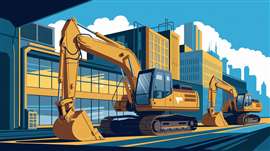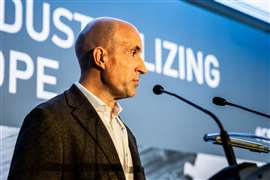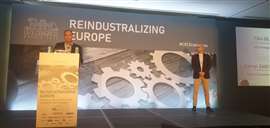European OEMs cast wary eye to US elections as they try to boost global competitiveness
04 November 2024
 Image generated with AI via Ideogram 2.0
Image generated with AI via Ideogram 2.0
Grey clouds hung low over Madrid as a mix of construction leaders, tech innovators and policy makers gathered in the Spanish capital’s financial district for the CECE Congress 2024.
The monochrome sky reflected an economic and political backdrop for European construction OEMs that could be described as somewhat gloomy.
But the atmosphere at the Melia Castilla hotel, where the event was held buzzed with purpose attendees considered how best to adapt and grow, recognising that in an unpredictable world, cooperation may be their strongest asset.
This year’s theme, Reindustrialising Europe, placed particular emphasis on how technological advancements, such as automation and digitalisation, can revolutionise construction and infrastructure development.
With Spain holding the presidency of the CECE for 2024-2025, the congress also underscored the importance of collaboration between European countries to strengthen the industry’s competitiveness on a global scale.
How pressing the need for a boost in European competitiveness is became clearer throughout the conference, as delegates heard more about how OEMs in the region need to pick their way through a series of challenges.
Volatility in demand
 Jose Nieto, speaking at the CECE Congress 2024 in Madrid, Spain (Image: CECE)
Jose Nieto, speaking at the CECE Congress 2024 in Madrid, Spain (Image: CECE)
Current CECE president and CEO of Putzmeister Iberico, Jose Antonio Nieto, told Construction Europe how the European construction equipment market is grappling with uneven demand across sectors and regions. He highlighted both the challenges and pockets of growth within Europe’s construction and mining markets.
According to Nieto, southern Europe is seeing modest growth, with countries like Spain, Portugal, and Italy experiencing slight upswings in demand for construction equipment. “Some markets are better than others,” he noted, pointing out that while these areas show resilience, much of the rest of Europe faces declines, especially as construction activity slowed significantly in the final quarter of 2023.
In contrast, Nieto observed a starkly different trend in mining: “Mining is booming,” he explained, underscoring the sector’s strong and growing demand for equipment. Although Europe lacks the extensive mining landscapes of other regions, local manufacturers are said to be benefitting from this upward trend.
Keeping a wary eye to US elections and European instability
Addressing the impact of geopolitical and economic pressures on the European construction equipment market, Nieto pointed to widespread hesitancy in both regional and global markets. When asked about the root causes behind slowing equipment demand, Nieto highlighted the complex political landscape, suggesting that buyers are withholding investment due to uncertainty.
“Geopolitical factors certainly influence the market,” he remarked, specifically mentioning the upcoming US elections as a potential inflection point. “If Trump wins, we can expect even greater protectionism on their side,” he said, warning that such a move could have a ripple effect globally. “When one country builds walls, the rest tend to follow.” And he described a potential scenario of increased economic isolationism that could stifle cross-border trade and investment in construction.
Nieto also underscored the impact of European political instability, which he believes is unsettling for potential investors. “Right now, there’s a lack of strong, stable government leadership in Europe compared to previous years,” he observed, pointing out that France and Germany’s current administrations have a weaker grip on power than their predecessors.
With an increase in coalition governments spanning the political spectrum, Nieto argued that many European countries lack the unified direction needed to instil confidence among business leaders. The resulting environment, he explained, leaves companies hesitant to invest in long-term projects—a trend that is likely to persist unless political stability improves.
Collaboration to stabilise growth
In the face of these pressures, Nieto called for a collaborative ecosystem within the construction equipment industry that could help stabilise growth, enabling companies to adapt more swiftly to regional shifts and capitalise on emerging opportunities in both traditional and expanding markets.
 Félix Gil and Gabriel García Rubio from Integra speaking at the CECE Congress 2024 in Madrid, Spain (Image: CECE)
Félix Gil and Gabriel García Rubio from Integra speaking at the CECE Congress 2024 in Madrid, Spain (Image: CECE)
He highlighted how “the sustainable reindustrialisation of Europe is essential for its competitiveness in the global marketplace and a crucial step toward achieving environmental goals. This should be a key priority for the next legislative term.”
He called for a European Union (EU) industrial agenda that embraces both digitalisation and innovation to secure Europe’s industrial future in a fast-changing global economy.
Echoing Nieto’s sentiments on collaboration, Felix Gil, CEO of Integra Tecnología, and Gabriel Garcia Rubio, head of innovation at Integra, highlighted a significant need for stronger collaboration within Europe’s construction equipment sector to drive competitiveness.
During their presentation, Gil and Rubio highlighted that European companies and industry stakeholders have an established network with “people who know each other, who are already in the same sector.”
However, to keep up with the rapid innovation seen in other global markets, they stressed the importance of “increasing collaboration” and “investing together in creating more value and improving pricing structures over time.”
Learning from the US and China
While collaboration does already exist, European companies could benefit from a more unified approach in order to compete with the support seen in the US and China, they contended.
In response to an audience question about why Europe might lag behind these regions in terms of collaboration, it was pointed out that it’s not necessarily a lack of willingness to collaborate but rather differences in government support for innovation.
European regulations also add layers of complexity, making collaboration and information-sharing challenging.
Gil and Rubio highlighted that regulatory frameworks sometimes inhibit open cooperation, which in turn can hamper innovation rates. “The regulation in Europe sometimes prevents us from sharing information,” they explained, observing that while Europe and the US are comparable in market size, the US tends to foster a more innovation-friendly environment. Additionally, he suggested that Europe’s comparatively limited funding pools could be a factor in the region’s innovation gap.
Fluctuating market demands
Sebastian Popp, economic affairs manager at CECE, provided an overview of the current state of the construction equipment sector in Europe, offering little in the way of optimism. He emphasised that the ongoing downturn extends well beyond the residential building construction equipment segment, affecting all European market regions, which have recently turned negative.
However, Popp indicated that the rate of decline might slow in the fourth quarter due to a statistical base effect. Still, he warned that a 20% sales decline in the European market for 2024 appears inevitable.
Looking ahead, Popp noted that replacement investments could emerge next year, particularly in the rental industry. He cautioned, though, that austerity measures are likely to return following years of stimulus spending, even as demand for infrastructure investments remains robust in many European regions.
The CECE Congress 2024 in Madrid provided a crucial platform for examining the current climate of the European construction equipment industry. The event highlighted a landscape marked by both challenges and opportunities, as stakeholders navigated issues such as geopolitical uncertainties, fluctuating market demands, and the need for sustainable practices.
Despite facing a downturn, there were indications that investment opportunities could arise, especially in infrastructure and rental sectors. Overall, the congress underscored the necessity of strategic partnerships and regulatory reforms as vital elements for revitalising Europe’s construction equipment market and fostering long-term growth.
STAY CONNECTED



Receive the information you need when you need it through our world-leading magazines, newsletters and daily briefings.
CONNECT WITH THE TEAM








